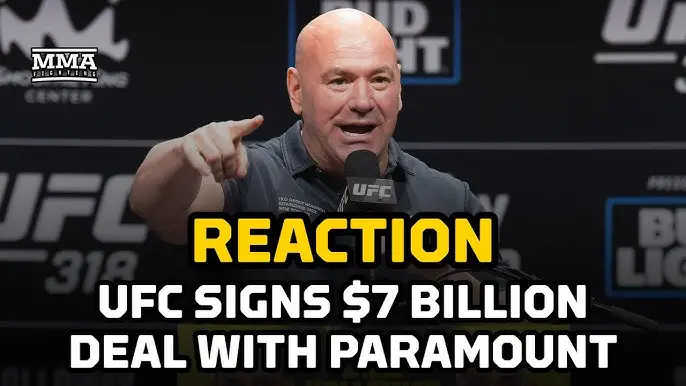The Ultimate Fighting Championship (UFC) has announced a historic media rights deal with Paramount worth $7.7 billion. This agreement marks one of the largest in sports broadcasting history and signals a major shift for the mixed martial arts giant.
For decades, UFC relied heavily on the pay-per-view (PPV) model to generate revenue from its biggest events. Now, under the new arrangement, fights will be broadcast widely through Paramount’s television channels and streaming platforms. This move is expected to expand UFC’s reach and make its events more accessible to millions of fans worldwide.
A New Era for UFC Broadcasting
The deal will allow UFC to tap into Paramount’s global network. This includes popular streaming services, sports channels, and international broadcasting partners. For fans, this means no longer having to pay high PPV prices for every major event. Instead, fights will be included as part of regular subscription packages, potentially increasing viewership numbers significantly.
Industry experts believe the shift could bring in a new wave of casual viewers who were previously reluctant to spend $70 or more for a single fight night. It could also help UFC grow in international markets where PPV was never a major part of the sports culture.
Why Paramount?
Paramount brings both reach and streaming expertise to the table. Its platforms, including Paramount+, CBS Sports, and international channels, already have strong subscriber bases. The deal positions UFC alongside other major sports leagues that have embraced streaming as the future of live sports broadcasting.
By partnering with a media giant, UFC gains not just financial security but also a strong distribution strategy. This is crucial as sports consumption continues to shift from cable TV to digital platforms.
Dana White’s Role and the Political Angle
While the deal has been widely praised in business terms, it also comes with political undercurrents. UFC President Dana White is a known supporter of former U.S. President Donald Trump. His outspoken political stance has been both a selling point for some fans and a source of controversy for others.
Critics worry that such strong political affiliations could alienate segments of UFC’s audience, especially younger viewers and those who prefer sports to remain neutral spaces. Paramount will now have to balance the promotion of UFC’s brand with the need to appeal to a broad, diverse fan base.
Impact on UFC’s Fan Demographics
The PPV model traditionally attracted hardcore fight fans who were willing to pay a premium for exclusive events. With the new deal, UFC will likely see an influx of casual fans, younger viewers, and international audiences.
However, political associations can influence public perception. Younger audiences tend to value inclusivity and neutrality in sports. If UFC events or promotions lean too heavily into political messaging, there’s a risk of losing these potential new fans.
Financial Implications
A $7.7 billion deal guarantees UFC a steady stream of revenue over the contract’s duration. This financial security can be reinvested into fighter pay, marketing, and global expansion.
However, some analysts note that moving away from PPV could impact short-term event revenue. The challenge will be to ensure that increased viewership from streaming compensates for the loss of PPV income. Given Paramount’s reach and the changing nature of sports media consumption, the long-term outlook appears positive.
The Future of Combat Sports
UFC’s move may set a precedent for other combat sports organizations. Boxing, for example, still relies heavily on PPV sales. If UFC’s streaming model proves more profitable and popular, boxing promotions might follow suit.
In the sports industry, accessibility is becoming a key driver of growth. Fans want content on-demand, affordable, and available on the platforms they already use. UFC’s decision to partner with Paramount aligns perfectly with this trend.
Final Thoughts
The UFC-Paramount $7.7 billion deal represents more than just a massive payday—it’s a bold step into the future of sports broadcasting. By embracing streaming and wider distribution, UFC is positioning itself for sustained growth in an increasingly competitive entertainment landscape.
Still, the organization must navigate the political sensitivities surrounding its leadership to ensure it maximizes its reach. If done right, this partnership could redefine how combat sports are consumed and enjoyed worldwide.




